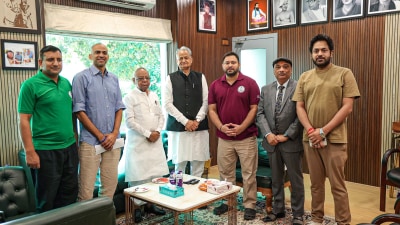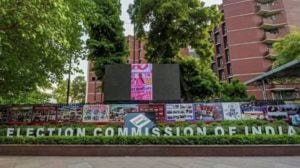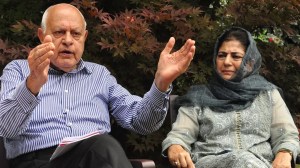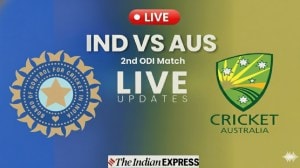‘After 17 flops in a row, you start saying: Have I made the right decision?’
• You know why we chose this spot, Marine Drive?I believe you shot here with dad?• And you know why he chose this spot? He said w...

• You know why we chose this spot, Marine Drive?
I believe you shot here with dad?
• And you know why he chose this spot? He said when he first came to Bombay, he slept on a bench here for a week. Of all the stars, he came from the school of hard knocks, isn’t it?
Most definitely. I think the wonderful thing is that he still remembers it and that’s what keeps him rooted. There’s a bakery called City Bakery in Worli. When we used to drive to town as kids, he always used to stop there, and say: You know, I used to eat here. Because post-11 at night when they had to clear out their stock, they used to drop the price of bread, and that was the only time he could afford it.
• They’ve removed the bench as part of their clean-up. I think when we have our equivalent of the Hollywood museum, they should find that bench and put it up, or maybe auction it-they’d make some money on it.
Yeah. So these are all memories-I remember coming here as a child and dad used to show us these places.
• And when he did that, did he ever say: This is a tough business, don’t get into it, try something else?
No, dad never said that. He’s always taught me that life’s a struggle, so get up and fight it. He said: You’re going to have to wake up every day and earn whatever you live on. And it’s not going to be easy, no matter what you do. Whatever you do in life, you’ll have to work very hard. But he never discouraged me from entering the business.
• You’ve had your own hard knocks too-a string of flops.
I think it’s all the process of life. It’s important to realise at an early stage what is required. When I first came into films, I had no clue what I was doing. I was just so excited to be given a job. I’d wanted to be an actor and had left college and come back to be with my dad because I felt he was going through a stage when he needed me. His company, ABCL, wasn’t doing well. So I left my education in America and came back to help him in whatever way I could.
I was a production boy on a film of his called Major Sahib-which basically meant that I was a glorified tea-maker. After that was over, I was looking for a job for about a year. I remember going to people and asking them for work, meeting a lot of directors. And nothing really happened. It was contrary to popular belief, because everybody thought there’d be a line of directors.
• Being Bachchan’s son.
And there really wasn’t. People were a bit apprehensive, to work with me. I presume nobody wanted to take on the pressure of launching me, so to speak.
• But, Abhishek, tell me: what is it like to handle failure so young? All of us, I find, can handle disappointments and failure much better when we’re a bit older.
I really feel it’s important not to romanticise the whole thing. I don’t make a big deal out of it. It’s the circle of life-what goes up must come down. It’s important to learn and be grounded and humbled at an early stage because then, I think, you appreciate it so much more.
• But do you sit and introspect over why some things went wrong?
I don’t know. I don’t like to look back and evaluate what I did wrong because I really feel it’s a waste of time. I think you should look ahead in life.
• But is it tougher to handle failure as a Bachchan kid, when the weight of expectation is so much?
No. Because that’s something I never thought about from the start of my career. In fact, I remember my first day of shooting, I was about to give my first shot. We were near Bhuj, in a small village. It was Refugee, my first film, with Mr. J. P. Dutta. Word spread that I was going to give my first shot. Some neighbouring villagers showed up to see Mr. Bachchan’s son give his first shot; the entire star cast showed up to give their support. And I panicked. Because when you see 10,000 people just looking at you, and you realise they’ve come to see you give your first shot, it’s a bit intimidating. When you’re 22 years old, it kind of gets to you. I completely panicked and I remember thinking: Oh my God, what’s my dad going to say if I don’t get my shot right, and they’re going pass judgement on me-I couldn’t work.
That evening, I went back and I said: Okay, this is not something you can think about. Because if you’re going to be thinking about the expectations and the pressures, you’re not going to concentrate on your job. And that’s what I’m here to do-I’m here to act. I’m not here to bother about expectations.
• But did you ever discuss this with your parents?
Many times. I think as a child you do look immediately to your parents for support whenever there’s some trouble around. They’ve always been exemplary in their support; they’ve always been there, no matter what. I mean, you start doubting yourself after a point of time. When you’ve given 17 flops in a row, you start waking up in the morning and saying: Wait; have I made the right decision? That’s what it does to you. And what happens with actors, because you’re public property, you have to get used to the fact that the public is going to pass judgement on you. Because it’s their right, you’re working for them; we’re entertainers.
• And you can’t afford to get resentful or bitter.
No, I never did. With the media which reviewed my films-most of which they didn’t like-it gets a bit tough to wake up every Friday and read about yourself being ridiculed. What I did was to look at it positively; I said: These are people pointing out what you should be doing.
• In that phase, were your parents ever tough with you? Did they say: Listen, you’re not doing this right?
Not at all. Whenever they saw a film, they said: Okay, we think you can improve over here; this is good, this is an improvement from the last time; try working it out this way. So they were just brilliant. I think that’s one of the greatest advantages I had.
• From whatever little understanding I have of cinema, I see the breakout moment for you as having been when you danced that Kajrare song with your dad. Do you see it that way?
My brief for that song was very simple. Aadi, the producer, and Shaad are both very good friends; this song was basically a situation between dad and Aish. So, when I asked them what do you want me to do in the song, Aadi said: You’re the comedian in the song, so just be there and have fun. So that’s what I did.
• But did you see it as a breakout point? You were in a song that was most likely to be a great hit.
Well, actually, it was more an extension of what we do pretty much on a daily basis. The first time I ever went to a club in my life, it was with my dad. That was in Boston. And over here as well-just down the road; there used to be this nightclub called RG’s he’d take me to.
• So tell me what happened at this nightclub in Boston?
He took a whole bunch of us out-my sister and me and a couple of our friends from school. Halfway through, I lost him; next thing I knew, there was my dad in the middle of the dance floor, burning it up-it was great fun.
Kajrare, it wasn’t the first time we’d worked together, but that was the first song we did together. And we had a blast. I remember we used to put the track on in the morning, and for an hour, the whole crew used to just dance. And that’s where we’d pick the steps up from, and then we’d just shoot them. We really did a bit of guerrilla warfare shooting. That’s pretty much how Bunty aur Babli was made, actually. We shot in about a hundred and twenty locations all over UP and Uttaranchal.
• Abhishek, you were nine when your father became an MP. That’s a very tender, sensitive age, and I know that you were a sensitive child. What impact did that make on your mind, your father’s dabbling in politics?
Well, to be very honest, that was the time I was sent to boarding school in Switzerland. So we were pretty much disconnected from everything that happened.
• But do you have any recollections of that time?
Yeah-weirdly enough, it was a very happy period. I remember it was a very happy because I got to spend a lot of time with dad. He wasn’t working in films regularly; he’d only go and make a film when there wasn’t Parliament. But when Parliament was on, he used to be home by three o’clock, after Parliament, and he’d help me with my homework and play with me in the evening-which was rare till then because when we were young, he was always working. So we didn’t see him as often as we would’ve liked.
• But do you remember times when he was either happy having made this choice, or unhappy about it?
No. You see, it’s also when you’re a child, you live in a bubble. You’re so pre-occupied with what you’re doing, that what’s actually happening around you doesn’t affect you as much. And we’ve always been very shielded from these things. Although, my father, ever since I was born, has made it a practice that no matter what’s happening in the family, everybody’s made to sit down and have the entire situation explained. When he decided to resign from politics, we were in Switzerland. He came up there, and he sat us down and said: This is the situation, this is what I want to do.
• What reason did he give?
He said: I don’t know politics. I’m not able to cope with it and I don’t think I’m doing justice to the job. I’d much rather that somebody who knows the job, who can serve the people in a better way, does it.
• Did you find that it stressed him out?
Today, when I think about it, yeah. Because I’ve understood him better as a person. At that point of time, he used to be Superman-you don’t even think about him that way. Today, now that I’ve grown up, I interact with him more, he talks to me about these things. I think it must have got to him because he’s very sensitive about these things, they bother him, and it must have been a big decision.
• And the bitterness that subsequently came between your family and the Gandhi family, having been so close together?
I never really witnessed any of that. Like I said, when I look back now at dad during that stage, I realise today that it must have really upset him a lot for him to want to leave it. Because I know my dad’s a fighter.
• Your mother said on this show that she would have preferred him to stay on in politics and fight, instead of getting out of it.
Yeah, she’s always maintained that, but I don’t think he was happy doing what he was doing.
• I read this remarkable passage in Suketu Mehta’s book, Maximum City, where he talks about your family getting together in the wee hours of the morning and getting a snack and talking about Iraq.
Well, that’s a common practice. What happens is we usually come back from work around 11.30 or 12 at night. The rule in the house is if we’re in the city, we have to have one meal together. No matter what, no matter what time. So it’s usually around midnight that we all meet. Another rule is that you can’t talk about work at the table.
• Do you disagree about things or do you pretty much follow the party line?
Every body has an opinion.
• Because that’s a question I’d asked your mother; I asked who wears the pants in the house. And she said: Obviously Amit-he’s the boss.
Umm, he is. But he doesn’t enforce that. Dad has never, as a father, been strict, he’s never been rigid. He’s very broad minded, very liberal. He’s never, ever raised his voice or his hands on us-ever-because he doesn’t believe in it. But despite his not enforcing his authority, he’s always had that authority. He’s my best friend-I talk to him about everything.
In fact, when I was driving here, I called him up and said I’m on my way. He was up, he was working-he’s in Rajasthan, shooting. So, he’s my best friend, but there’s a particular point beyond which I’m not going to go. It’s just a respect I feel he deserves. He doesn’t say: I’m the head of the family and this is what’s going to happen. He always sits us down and asks everybody for their opinion; he likes us to work as a team.
• Something like Abhiman, did you ever see that as having an echo in your family? When you look back, do you remember that tension being present at home, that competition between two great stars, two talented people?
No. Never. I never actually saw Abhiman in entirety until about mid-1990. For us, at home, dad was dad and mum was mum, and then they were actors. Anyway, ever since I was born, mum’s always been at home; so I’ve never really seen her act.
• So, tell me where do you see yourself? If dad was the Angry Young Man, what do you see yourself making a mark as? You’re not the chocolate-box romantic hero.
I feel that those kinds of classifications have become archaic now. In the film industry, it’s evolved, it’s changed. In those days, there were very definite slots that actors were put into. I don’t think that that exists any more.
• Talking about hard knocks, you’ve also taken a couple on the personal front. Did those affect you?
I think everything in life affects you. It’s how you decide to conduct yourself after that that matters.
• Well, you have conducted yourself with great dignity. I’m referring to the whole Karisma phase. Did it get you down for a while? How did you handle it at that age?
Well, I’m a human being. That’s what people tend to forget about actors, that despite the fact that they’re celebrities and they lead their lives on a public platform, they’re also human beings, they do have feelings and they feel strongly about certain things and they get affected by them. But, like I said, I’m not a bitter person, I believe in looking forward and not looking back. Something doesn’t work out, it doesn’t work out.
• And how do you now look at the problems that have happened, in her marriage-do you look at her as a friend, or do you not think about it one way or the other?
It’s none of my business. I don’t think it’s my place to pass judgement.
• You’re done with it.
Yes. But, like I said, it’s none of my business and I think it’s rude to intrude into somebody else’s life.
• If you look at Hindi cinema, Hollywood, what are the roles that you would like to do?
Actually, a favourite question from a lot of people is: Which is the one role of dad’s that you would love to do?
• I didn’t ask you that one, but you can tell us that too.
There’s one role of dad’s I know I wish I never get to do, and that’s his role in Black.
• Because it’s so tough?
No, it’s just perfect. It was the first time I saw a movie-and, you know, as an actor when you watch a movie, you see it on different levels: how it’s made, how it’s performed; how the actors use their craft, what they must have thought. That was one movie in which I just watched the film and enjoyed and absorbed the performances. I understood that’s one movie you shouldn’t touch.
• So which one of your dad’s roles would you like to do? Although that must be a pretty well-rehearsed answer and although I didn’t ask you that.
I’d love to do Agnipath-I think that was an outstanding performance. But then again, in every film you say, okay this one as well. Then another movie releases and you say, This one too. That’s just him; even at this age, he keeps surprising you.
• When you think of the great movies, Indian and international, what kind of roles do you think you’d like to be remembered for?
I hope that role is still to come. I’m still very young, you know. I’ve been acting for the last seven years. I’ve had twenty-five odd releases. Compared to other actors, that’s still very few releases. I’ve still got a long way to go.
• But tell me a dream role. I know you watch a lot of films-do you watch them critically?
No. I don’t believe in analysing a film. When you start analysing a film , you don’t watch it. You watch a film and you either like it or you don’t-it’s as simple as that. When you say you like a film, it means it’s absorbed you, you’ve been entertained by it. But the minute you say: Okay, the first half was nice, but the second half was a bit slow, the editing was weak, the lighting wasn’t very good-you haven’t enjoyed the film. You’re looking at it technically.
• But you don’t have a dream role, some film that you’ve seen and you say, Oh this is a perfect film.
You do that every day, with every film. Every film an actor sees, you think of what you would have done, how you could have done it. That’s just what we do; we think of ourselves in that situation and how we would have reacted to it. So, that’s with every film. But I think there are still many more roles to do before I can really come to a juncture where I can say: This is what I’d really want.
• So, Abhishek, now one of the hottest stars in Hindi cinema..
Oh no, far from it.
• One of the most eligible bachelors in India-how do you handle the fame and adulation? Are you philosophical about it?
I think, just be humble; be thankful, most importantly, to the people who are responsible for putting you there-the audience. Thank them for their love and respect, and just know that tomorrow it’s not going to be there. So, just cherish it while it lasts because it is going to go away.



- 01
- 02
- 03
- 04
- 05




























